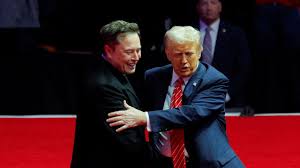The once-unlikely political “bromance” between President Donald Trump and tech titan Elon Musk has spectacularly imploded this week, escalating into a bitter public feud played out across social media and in the hallowed halls of the White House. What began as a policy disagreement over a sweeping budget bill has rapidly devolved into personal attacks, accusations of ingratitude, and veiled threats, signaling a dramatic rupture in one of the most powerful and unusual alliances in American politics.
The rift began to fully emerge as Musk, fresh off concluding his 130-day stint as head of the White House’s Department of Government Efficiency (DOGE), launched an all-out assault on Trump’s signature “Big Beautiful Bill.” The comprehensive tax-and-spending package, which recently passed the House, drew Musk’s ire for its projected contribution to the federal deficit, with the billionaire calling it a “disgusting abomination” and urging Congress to “kill the bill.”
President Trump, initially seeming to downplay Musk’s dissent during a recent Oval Office appearance where he lauded Musk’s contributions to DOGE, swiftly shifted his tone. On Thursday, Trump unleashed a furious counter-attack, suggesting Musk’s criticisms stemmed from petty jealousy and a longing for his former White House role.
“Elon was ‘wearing thin,’ I asked him to leave, I took away his EV Mandate that forced everyone to buy Electric Cars that nobody else wanted (that he knew for months I was going to do!), and he just went CRAZY!” Trump wrote on Truth Social. He then appeared to threaten government subsidies and contracts vital to Musk’s sprawling empire, including Tesla and SpaceX, declaring, “The easiest way to save money in our Budget, Billions and Billions of Dollars, is to terminate Elon’s Governmental Subsidies and Contracts. I was always surprised that Biden didn’t do it!”
Musk, rarely one to back down, immediately hit back on X (formerly Twitter). He denied Trump’s claim that he had prior knowledge of the bill’s contents, stating, “This bill was never shown to me even once and was passed in the dead of night so fast that almost no one in Congress could even read it!” He acknowledged that some of his opposition stemmed from the removal of electric vehicle tax credits but reiterated his primary grievance with the bill’s “MOUNTAIN of DISGUSTING PORK in wasteful spending.”

The Tesla and SpaceX CEO then escalated the personal jabs, taking credit for Trump’s electoral success. “Without me, Trump would have lost the election, Dems would control the House and the Republicans would be 51-49 in the Senate,” Musk posted. “Such ingratitude.” He further insinuated that Trump’s reluctance to release the full Epstein files was due to the President’s alleged presence within them, a claim for which no evidence has been publicly presented.
Trump, for his part, dismissed Musk’s electoral claims, stating he “would have won Pennsylvania regardless of Elon” and expressing deep “disappointment” in the billionaire. He also suggested that Musk might be suffering from “Trump Derangement Syndrome,” a term he often uses for former allies who become critical after leaving his orbit.
The public spat has sent ripples through financial markets, with Tesla shares sliding amidst the intensifying rhetoric. It also exposes deepening divisions within the Republican Party’s donor base over fiscal policy, particularly regarding government spending and the national debt.
This dramatic falling out marks a significant turning point for two of the world’s most influential figures. Their alliance, once seen as a formidable fusion of political power and technological vision, has fractured over policy and personality, leaving the future of their relationship, and potentially the direction of some key government initiatives, in stark uncertainty. The “bromance,” it seems, is definitively over.